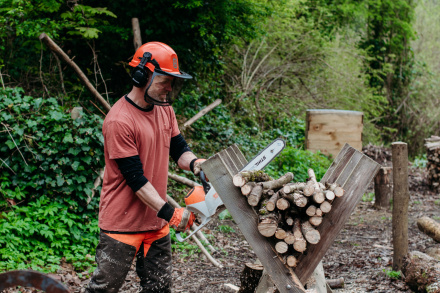
Make a split hazel 'swallow's nest' basket
- The Green Wood Centre
- 05 Jul 2025
20 Gorff 2023

Back in June, we held a policy conference to look at the issues surrounding woodfuel following the publication of the Government’s Environmental Improvement Plan, which commits it to reduction of particulate emissions which are deemed to be injurious to human health. Much of the debate around the issue has been one sided, as those advocating for greater control have done so in the press or direct to Government, while those who wish to maintain of the important role played by woodfuel have so far been less vocal.
We sought therefore to bring the different sides of the debate together for a reasoned conversation, and to help facilitate more balanced discussions in future. Our brief was to ensure the woodfuel sector is as well informed as possible and to draw relevant conclusions. We feel the public debate so far has not benefited from sufficient input regarding the benefits that the woodfuel sector provides and it was our intention that those be heard, alongside a review of the issues that result from the emissions that arise. Attendees were deliberately mixed, so that all sides of the debate could be heard and included atmospheric pollution academics, policy organisations, Government and Government agencies, individual woodland managers/owners, firewood producers of varying sizes and representatives of the wood using and wood producing sector.
The following is a summary of the briefing, aiming to give a balanced picture of the role woodfuel plays:
| - Woodfuel continues to have a key role in enabling woodland management, biodiversity in particular benefits from the role it plays. Without woodfuel, fewer woodlands would be managed and biodiversity would decline. Any control of particulate emissions should be balanced against the need to maintain the very positive role that woodfuel plays in conservation and management. |
| - Older houses designed to be heated by woodfuel do not always convert well to alternative forms of heating, with blocked chimneys having led to increases in condensation and black mould, which also have negative impacts on human health. |
| - Particulate emissions in the UK atmosphere have declined by 90 per cent since the 1970s, however, improvements in air quality that have been ongoing since the 1970s have stalled in recent years and may be going into reverse. |
| - The vast majority of the data being used to justify control is modelled, and questions have been raised about the assumptions built into those models. It is likely they overstate the contribution from domestic heating. |
| - Woodfuel use is growing and wood burning stoves continue to be installed in houses old and new. Domestic burning is only one part of emissions, with other sources likely to be responsible for at least part of any possible increase. |
| - Particulate emissions arise from a wide range of sources, including barbecues, garden fires, fire bowls, wildfires, burning of arisings on building sites, agriculture, forestry and conservation management sites, many of which are increasing. The contribution of woodfuel to particulate emissions can be argued to be around 10 per cent: this is the figure that emerges from the last empirical research. |
| - Air quality control has been assigned to local authorities. There is concern that they do not have the skilled staff needed to target control measures appropriately – authority-wide control measures would not be appropriate in most cases. |
| - While the World Health Organisation regard there to be no safe level for atmospheric particulates, their policy is driven by those countries such as India, where urban areas still suffer from widespread smog, driven by urban use of solid fuel, mostly coal. |
| - Particulate emissions travel long distances and are changed in the atmosphere through contact with the range of materials and forces, i.e. heat, moisture, radiation and other particulates, leading to the multiplication of particulates and their effects. |
We have therefore identified the following actions:
| Inform: there is a continuing need to inform all involved in this debate about the pros and cons relating to woodfuel. |
| Influence: there is a need to engage with the debates around woodfuel and continuing to invite discussion. |
| Standards: the new woodfuel and stove standards play an important part in maintaining and improving air quality. |
| Improve: more training and awareness raising is needed to improve standards. The data also needs to be tested and improved. |
| Innovation: research is needed to find cost-effective ways of reducing emissions further, such as flue filtration. |
This is a complex and multi-faceted debate, which has perhaps not benefited from sufficient balance to date.
We have concerns about the data being used, the policy development process being followed and the local implementation of control and would welcome further debate with policy makers. We would suggest that policy makers should not 'let the perfect be the enemy of the good' in pursuit of ever-higher air quality standards and would guard against further woodfuel control given the wide range of livelihood, biodiversity, fuel poverty and wise resource use benefits that the sector embodies.
We aim to share these conclusions with participants, along with the relevant ministers.